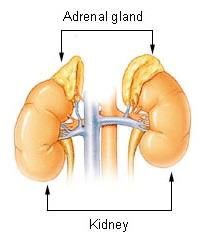


Joseph R Anticaglia MD
Medical Advisory Board
Corticosteroids (steroids) are a group of anti-inflammatory systemic medications produced naturally in the body or manufactured synthetically outside the body. They relieve redness and itchiness, reduce swelling, used to treat people in shock and are used to counteract severe allergic reactions. These medicines treat a variety of conditions such as arthritis, asthma and other diseases. They are not to be confused with anabolic steroids used by athletes illegally to enhance their performance.
Besides being used for acute conditions, corticosteroids have been useful in the treatment of chronic diseases and “flare-ups” of diseases. These steroids resemble the actions of cortisol, a hormone that is made naturally in the adrenal cortex.
The adrenal gland rests on top of each kidney and can be divided into two parts: the cortex and the medulla. The adrenal cortex is the outer part of this gland and corticosteroid derives its name from “cortex.” Cortisol reduces inflammation, suppresses the immune system and helps your body respond to stress or danger (stress hormone). The medulla secretes the hormone that regulates the balance of salt and water in the body (aldosterone).

Prednisone is an example of a corticosteroid which is manufactured by drug companies. It’s a systemic steroid, meaning it travels throughout the body when it’s prescribed orally or given by injection. This medication affects the whole body in contrast to local, topical steroids which can be inhaled, used on the skin, ears, nose or eyes.
Steroids are commonly injected into joints of patients with rheumatoid arthritis or to relieve symptoms of tendonitis of the elbow, hand, knee or shoulder. Their anti-inflammatory effects and their ability to decrease the activity of the immune system make them useful in a variety of conditions.
Rita is a 26 year old women diagnosed with Crohn’s disease when she was a 19 year old college student. This Inflammatory Bowel Disease, at times, “flares-up” with symptoms of fever, diarrhea, intense pain and cramping over the lower abdominal area. Prednisone has been useful in relieving the discomfort and pain from the periodic outbursts of this disease, perhaps by lessening Rita’s overactive immune system.
Amanda is a ten year old youngster with a history of asthma and being allergic to animal dander. She visited her classmate who has a cat. In spite of isolating the cat, Amanda became dangerously short of breath. She was rushed to the emergency department of the local hospital and was transferred to the pediatric intensive care unit. She was treated with intravenous steroid medications plus other drugs to get her well.
Young and old have benefited by the use of these medications. These conditions include:
Although corticosteroids have been shown to be useful in a variety of conditions, their use, particularly at higher dosages and for longer periods of time, have the potential to cause harmful side effects.
Use of corticosteroids can cause acne, fluid retention, mood swings, facial hair growth and spikes in blood sugar and blood pressure. You may become more susceptible to infections because of impaired immune system.
Prolonged use makes one susceptible to cataracts, osteoporosis (brittle bones) and in teens, the use of these drugs stunts their growth. You are at a greater risk to develop diabetes and adrenal insufficiency wherein the body cannot respond adequately to the stress of illness or surgery (because of lowering of the available cortisol due to the use of corticosteroid).
Corticosteroids are potent medications with history of saving many lives and putting other lives at grave risks. They can worsen your diabetes, lead to fractures, cause a spike in your blood pressure and if you’re pregnant, taking steroids can adversely affect the fetus. Speak with your physician and let her know the medications you are taking and the steps you may take to become better informed about the benefits and dangers of using steroids. Gradually reducing steroids is the best way to discontinue such medications.
This article is intended solely as a learning experience. Please consult your physician for diagnostic and treatment options.